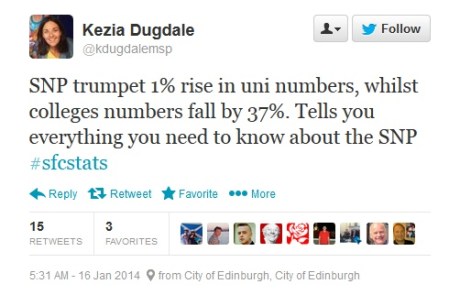Archive for the ‘stats’
The art of selection 172
Here’s the Herald today on YouGov’s latest independence polling:
All absolutely true. But is it the whole truth?
Stories of the week, 2-2-14 22
The top five most-read stories on Wings Over Scotland in the last seven days.
1. The honesty patrol
Cybernats!
2. The lonely hours
Cybernats!
3. Cybernat of the week
CYBERNATS!
4. The Mars bar at your seat
Idiot.
5. You’d need a heart of stone
Idiot whines about cybernats.
Eesh. Grim stuff. Let’s hope for a more pleasant week to come.
Busy busy bees 186
We like to put a bit of extra effort in in January. The excitement of a fresh new year, coupled with the need to shake people out of the festive-period stupor that otherwise kills momentum stone dead, calls for 110%. Even so, with the slow opening week and then losing most of a weekend to a server outage, we weren’t expecting this.
Not only were January’s pageview stats more than 30% up on December, but they also smashed the all-time record set in November by well over 100,000.
Bad news for binmen 76
The Guardian tonight reports, by way of covering Johann Lamont’s debacle at First Minister’s Questions today, an interesting snippet related to our post of earlier today:
Half a million? This weekend? Are we sure about that?
Trouble with numbers 73
We’re not sure which of The Scotsman and Murdo Fraser of the Scottish Conservatives was most confused this morning. Reporting on the second half of its intriguing ICM poll (which put the gap between Yes and No votes as low as six points), the paper publishes some data about the attitude of Scots to the EU.
Excluding don’t knows, the results provide a clear 16-point margin for Scotland remaining in Europe, at 58% to 42%. (The raw numbers put it only slightly lower, at 46 to 33.) But for some odd reason the newspaper chooses to reveal this vote of confidence under the bafflingly negative headline “A third of Scots would back exit from EU”, without even an “only” in there to reflect the implication of the stats.
Weirder still is Murdo Fraser’s reaction, though.
Stories of the week, 26-1-14 65
The top five most-read stories on Wings Over Scotland in the last 7 days.
1. The bully pulpit
The Scottish Daily Mail “unmasks” some devilish “cybernats”.
2. Walls come tumbling down
The scare stories of Project Fear begin to crumble.
3. Eleven words of truth
The UK government’s latest propaganda paper starts well.
4. A frightened man
Jim Murphy MP demands nobody be allowed to challenge the No campaign.
5. To a grouse
The poem so good that we published a poem.
Revealed: the price of independence 195
Today’s release of the 2013 Scottish Social Attitudes Survey results provided an interesting pair of stats. Scottish people told pollsters ScotCen that they’d favour independence by a very big margin (52% to 30%, or 63 to 37 excluding Don’t Knows) if they could be assured that they’d be personally £500 a year better off.
However, if merely assured that they’d be neither better nor worse off that they are now, the No vote narrowly came out on top, by (again excluding DKs) 54 to 46. An obvious question therefore presented itself: just how big a bribe do Scots need to take responsibility for their own country?
What Scotland’s afraid of 116
The headline findings of the Scottish Social Attitudes Survey compiled every year by ScotCen are of limited use in the context of the independence referendum. The main constitutional question it asks is deeply unhelpful, with a vague, all-encompassing “devolution” option that tell us next to nothing about how Scots will vote.
(To be fair, that’s not the survey’s fault – it was designed long before the referendum was ever thought of as a reality, for a broader purpose, and asks the same questions every year for consistency of comparison.)
But the results for 2013 are interesting – as they always are – because they tell us what Scotland thinks when the debate is moved away from overtly political questions, they tell us where the arguments are being won and lost, and they enable us to determine just why Scots are the only people on Earth who’ve been (so far) successfully made scared of running their own country.
Incomplete information 100
Here’s Labour MSP Kezia Dugdale today:
Except that’s not quite EVERYTHING we need to know, is it, Kezia?
The teachers are afraid of the pupils 72
It’s always a concerning state of affairs for any society when newspaper journalists appear less well-informed and less capable of intelligent analysis than their readers.
So we felt a letter published in today’s Herald deserved a wider audience.
Wanting what you can’t have 36
Yesterday’s Scotland on Sunday took a slightly strange angle on the results of a social-attitudes survey conducted by the thinktank “British Future” last month.
…or put another way, MORE than half of them DON’T believe that. But anyway.

























